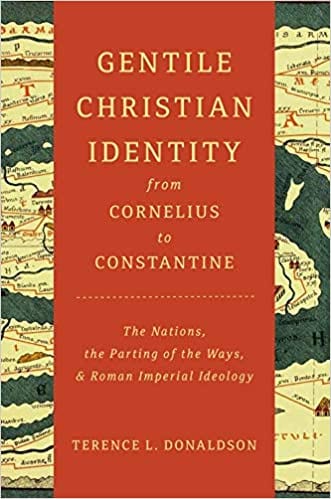Q. Much of the focus of this book is on the varied and changing use of specific terms like ethne and what it might reveal about the changing perspectives not only on Gentiles but also on non-Christ following Jews. If I’m reading you right, while there is a spectrum of belief about these things in the earliest period in the NT era itself and perhaps on into the beginning of the second century clear supersessionism or replacement theology (the church replaces Israel as God’s people) does not arise until after the NT era when the proto-orthodox or mainstream church is largely ethnically Gentile. Am I right about this?
A. Yes, as I indicated in response to the previous question, I think that, by the middle of the second century at least, decisive new steps were taken in the largely gentile, proto-orthodox church as it attempted to position itself with respect to Greco-Roman world on one side and relationship with Jews and Judaism on the other. I won’t say anything more about that here, though I will pick up one point about terminology.
The term “supersession” describes a situation where, by virtue of its perceived superiority, one entity comes to occupy a position that previously belonged to another, the displaced group becoming outmoded or obsolete in the process. The term, then, carries with it the idea that the superseded entity did have some validity or value in the past. Thus it is appropriate for those forms of Christian self-definition that see the church as a new stage in God’s dealings with the world—the fulfillment of prophetic promises, the beneficiaries of a new covenant, even the “new Israel.” But some forms of the Christian self-definition that emerge in this period go farther, to deny any positive value to the “old covenant” at all, and to see the church simply as a continuation of a line of scriptural heroes who related to God on different, essentially “Christian” terms. It seems to me that supersession doesn’t adequately convey this kind of approach, where Torah-centred Jewish identity was emptied of any positive significance. In the book I suggest that this constitutes not supersession but something like arrogation or appropriation, an approach “in which the gentile church redefined the dramatis personae in Israel’s story in such a way that the positive human characters in the story were identified as prototypical Christians (true Israel), while the negative characters constituted the people of the Jews.” I’m not sure that appropriation is the right term here; perhaps the situation was more one of “expropriation.” In any case, while “supersession” describes one aspect of Christian self-definition adversus Judaeos during this period, it doesn’t quite capture the whole story.













